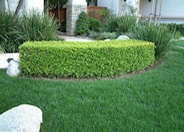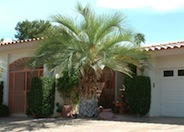
Common name:Hybrid Tea Rose (selections)
Botanical name:Rosa Hybrid Tea varieties
These shrubs and vines are the most loved in the Western USA and are very resilient. They come in a wide variety of sizes and colors and are easy to maintain with proper care. They can be used in a water-conserving garden with careful attention to irrigation practices.

Common name:Japanese Boxwood
Botanical name:Buxus microphylla japonica
Japanese Boxwood is often used as a hedge. It is compact, with small bright green leaves. It can reach 4'-6' tall and wide or be kept smaller through pruning. It can be sheared to shape. It does better in areas with milder winters.

Common name:Cork Oak
Botanical name:Quercus suber
The Cork Oak is an evergreen with moderate growth to a height of 70'-100' and as wide. Both the trunk and main scaffold branches are covered with cork (the cork of commerce). Its leaves are 3" long, and dark green in color.

Common name:Pindo or Jelly Palm, Yatay
Botanical name:Butia capitata
This slow-growing tree has leaves that vary from bluish gray to green and has round, yellow to orange fruit that is edible and delicious. Arching leaves spread 10'-15' wide; palm can reach 20' tall.

Common name:Parasol Aeonium
Botanical name:Aeonium arboreum
Parasol Aeonium is an upright succulent with rosette leaf clusters. It forms a mound and can be easily propagated by cuttings.

Common name:Tree Roses
Botanical name:Rosa Tree varieties
Tree roses are actually shrubs that have been grafted or grown in a way that looks like a tree, ie with a trunk. Tree roses can be floribundas, hybrid teas, or grandifloras. They are typically used as specimen plants. Make sure the plant is tied to a stake in case of strong winds.
Pest Management
Are pests bugging you? If pests are taking over there might be a good reason! Instead of grabbing that bottle of spray, consider using techniques that can solve your pest problems without toxic pesticides.
Click in the green box for more information
| Designer: | Elegant Patio Furniture |
Photographer: GardenSoft |
Soils and Compost:
Physical weed control, including mulching, or hand removal protects the watershed from harmful chemicals.
Water Saving Tip:
Mulching and adding compost to soil can minimize evaporation and help soil absorb and store water.
Integrated Pest Management:
Attract, or buy beneficial insects such as ladybugs and lacewings to control pest outbreaks in your garden.

